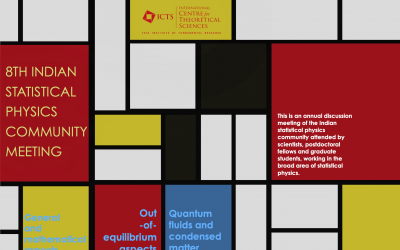This is an annual discussion meeting of the Indian statistical physics community attended by scientists, postdoctoral fellows and graduate students, from across the country, working in the broad area of statistical physics.
This meeting will be the 8th in the series and will cover all the 8 topics covered at STATPHYS meetings, namely -
General and mathematical aspects
Rigorous results, exact solutions, probability theory, stochastic field theory, phase transitions and critical phenomena at equilibrium, information theory, optimization, etc.
Out-of-equilibrium aspects
Driven systems, transport theory, relaxation and response dynamics, random processes, anomalous diffusion, fluctuation theorems, large deviations, out-of-equilibrium phase transitions, etc.
Quantum fluids and condensed matter
Strongly correlated electrons, cold atoms, graphene, mesoscopic quantum phenomena, fractional quantum Hall effect, low dimensional quantum field theory, quantum phase transitions, quantum information, entanglement, Lüttinger liquid, spin liquid, etc.
Disordered and glassy systems
Percolation, spin glasses, structural glasses, metallic glasses, jamming, glass transition, algorithmic problems, etc.
Biological physics
Molecular motors, single and multicellular dynamics, bacteria, swimmers, spatio-temporal organization, biological membranes, biopolymer folding, genomics, biological networks, evolution models, evolutionary game theory, etc.
Soft matter
Simple and complex fluids, active matter, molecular and ionic fluids,wetting, self-assembly, polymers, gels, liquid crystals, microemulsions, foams, membranes, colloids, granular materials, etc.
Nonlinear physics
Dynamical systems, chaos (classical and quantum), pattern formation, chemical reactions, hydrodynamic instabilities, turbulence (classical and quantum), etc.
Interdisciplinary and complex systems
Networks and graphs, epidemics, econophysics, social phenomena, traffic flow, ecology, etc.
Eligibility criteria: Open to all graduate students, postdoctoral fellows and faculty members working in any of the different areas of statistical physics listed above.
ICTS is committed to building an environment that is inclusive, non-discriminatory and welcoming of diverse individuals. We especially encourage the participation of women and other under-represented groups.
 icts
icts res
res in
in

